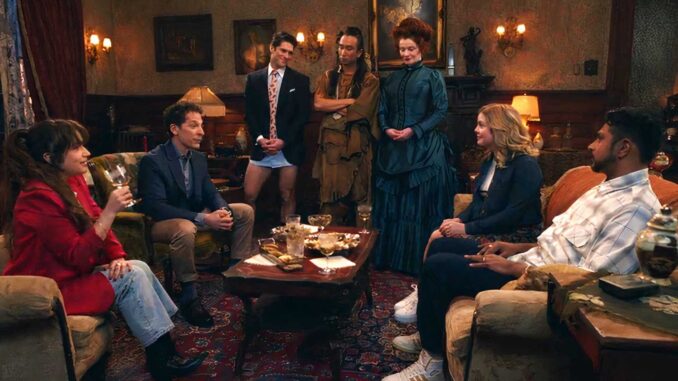
The spectral residents of Woodstone Mansion, the charmingly chaotic ensemble of CBS’s Ghosts, have carved out a unique niche in the sitcom landscape. Their humor is often born from their anachronisms and personal foibles, but their enduring appeal lies in the surprisingly deep emotional connections they forge, both with each other and with the living. Nowhere is this more powerfully illustrated than in the lead-up to Season 4, when Trevor’s most uncharacteristic decision – the infamous relinquishing of his pants – is not just a comedic beat but a pivotal moment of character growth, utterly justified by a fascinating real-life connection among the show’s stars.
From the moment he first materialized, Trevor has been the quintessential 90s bro: smarmy, superficial, obsessed with sex, status, and, of course, his designer pants. He’s the embodiment of pre-death entitlement, a spectral frat boy whose self-absorption often verges on the pathological. His character arc, while subtly woven through the seasons, has largely revolved around his slow, grudging realization that true connection offers more than fleeting gratification. Yet, even as he shows glimmers of loyalty and concern for his fellow ghosts, the idea of Trevor voluntarily giving up his most prized possession – the symbolic representation of his identity and swagger – for anyone seemed, on paper, almost unthinkable.
Which is precisely why his decision to throw his pants into the basement vortex to save Isaac in the climactic moments before Season 4 felt like such a seismic shift. It was a genuine act of selfless sacrifice, a guttural roar of panic and protectiveness that transcended Trevor’s usual shallow concerns. It wasn't just uncharacteristic; it felt almost revolutionary for his character. And yet, for the audience, it landed with an undeniable emotional authenticity, making us cheer for the unlikeliest of heroes. The justification for this seemingly impossible leap of character development lies not just in clever writing, but in the palpable, undeniable real-life camaraderie of the Ghosts cast, particularly between Asher Grodman (Trevor) and Brandon Scott Jones (Isaac).
The chemistry among the Ghosts ensemble is legendary. Interviews, social media posts, and behind-the-scenes glimpses consistently reveal a cast that genuinely enjoys each other’s company, who are not just colleagues but true friends. This isn't mere professional civility; it's a vibrant, infectious bond that spills over into every scene. They praise each other’s improvisational skills, laugh freely together, and speak with profound affection about the joy of working on the show. This authentic connection acts as a narrative Rosetta Stone, allowing the audience to believe in the characters’ evolving relationships and emotional stakes, even when the premise involves talking to the dead.
In the case of Trevor and Isaac, this real-life connection becomes the very bedrock upon which Trevor’s surprising heroism is built. While their characters began as a delightful odd couple – the flamboyant, repressed Revolutionary War captain and the boorish finance bro – their interactions have steadily grown into a nuanced friendship marked by begrudging respect and surprising moments of vulnerability. This growth on screen is amplified by the genuine rapport between Grodman and Jones. Their shared comedic timing is impeccable, but it’s their capacity for genuine pathos that truly shines. When Isaac is in peril, and Trevor, for perhaps the first time in his afterlife, truly fears losing someone, the audience believes it because we’ve seen the actors’ own bond strengthen over seasons. It’s not just the script dictating the emotion; it’s a reflection of the performers’ investment in each other, both as actors and as people.
The act of Trevor throwing his pants into the abyss becomes more than just a shocking comedic beat; it becomes an emotional anchor. It signifies that the bonds forged in the afterlife have transcended Trevor's superficiality, pulling him into a deeper sense of belonging and responsibility. His sacrifice isn't a plot convenience; it's the culmination of an ongoing, organic process of growth, fueled and made utterly believable by the genuine affection that exists between the actors playing these roles. When we see Trevor's uncharacteristic selflessness, we’re not just seeing Asher Grodman performing; we’re witnessing the profound impact of a genuinely connected ensemble, whose real-life joy in collaboration breathes life into even the most outlandish character developments.
Ultimately, Ghosts excels not just because of its clever premise or sharp writing, but because its heart beats with the genuine warmth of its cast. Trevor’s decision to sacrifice his pants, once seemingly impossible, becomes the ultimate testament to the show’s power to transform, to grow, and to deeply connect with its audience. It justifies his evolution because the "fascinating real-life connection" among the stars provides the vital emotional scaffolding, proving that sometimes, the most profound character shifts are best understood through the authentic bonds that exist, not just on screen, but between the people who bring those characters to life.